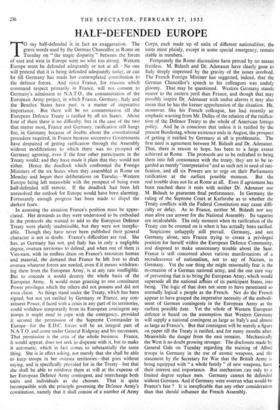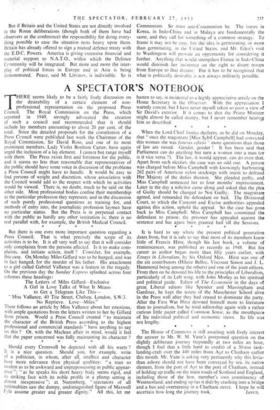HALF-DEFENDED EUROPE
T0 say half-defended is in fact an exaggeration. The grave words used by the German Chancellor at Rome on Tuesday on " the tragic disparity " between the forces of east and west in Europe were no whit too strong. Western Europe must be defended adequately or not at all. No one will pretend that it is being defended adequately today, or can be till Germany has made her contemplated contribution to the defence forces. And since France, for reasons which command respect primarily in France, will not consent to Germany's admission to N.A.T.O., the consummation of the European Army project, in which France, Germany, Italy and the Benelux States have part, is a matter of imperative importance. But there will be no consummation till the European Defence Treaty is ratified by all six States. About four of them there is no difficulty, but in the case of the two that matter most, France and Germany, ratification still hangs fire, in Germany because of doubts about the constitutional procedure required, in France because successive Governments have despaired of getting ratification through the Assembly without modifications to which there was no prospect of Germany agreeing, even if the four other participants in the Treaty would; and they have made it plain that they would not either. Hence the deadlock which confronted the Foreign Ministers of the six States when they assembled at Rome on Monday and began their deliberations on Tuesday—Western Europe being left meanwhile with the prospect of being even half-defended still remote. If the deadlock had been left unresolved the outlook for Europe would have been alarming. Fortunately enough progress has been made to dispel the darkest fears.
In assessing the situation France's position must be appre- ciated. Her demands as they were understood to be embodied in the protocols she wanted to add to the European Defence Treaty were plainly inadmissible, but they were not inexplic- able. Though they have never been published their general character is not in doubt. France's difficulties are real. She has, as Germany has not, and Italy has in only a negligible degree, oversea territories to defend, and when one of them is Viet-nam, with its endless drain on France's resources human and material, the demand that France be left free to draft oversea whatever forces are needed, even if it means withdraw- ing them from the European Army, is at any rate intelligible. But to concede it would destroy the whole basis of the European Army. It would mean granting to one constituent Power privileges which the others did not possess and did not even claim. As things stand under the Treaty, which has been signed, but not yet ratified by Germany or France, any con- stituent Power, if faced with a crisis in any part of its territories, could withdraw temporarily from its European contingent any troops it might need to cope with the emergency, provided it secured the permission of the Supreme Commander in Europe—for the E.D.C. forces will be an. integral part of N.A.T.O. and come under General Ridgway and his successors. That permission is the crux of the whole business. France, it would appear, does not seek to dispense with it, but to make it automatic, which in fact comes to substantially the same thing. She is in effect asking, not merely that she shall be able to keep troops in her oversea territories—that goes without saying, and is specifically provided for in the Treaty—but that she shall be able to reinforce them at will at the expense of her European Defence Army contingent, and interchange both units and individuals as she chooses. That is quite incompatible with the principle governing the Defence Arniy's constitution, namely that it shall consist of a number of Army Corps, each made up of units of different nationalities; the units must plainly, except in some special emergency, remain stable in numbers.
Fortunately the Rome discussions have proved by no means fruitless. M. Bidault and Dr. Adenauer have dearly gone to Italy deeply impressed by the gravity of the issues involved. The French Foreign Minister has suggested, indeed, that the German Chancellor's speech to his colleagues was unduly gloomy. That may be questioned. Western Germany stands nearer to the eastern peril than France, and though that may possibly inspire Dr. Adenauer with undue alarms it may also mean that he has the keener apprehension of the situation. He, moreover, like his French colleague, has had recently an emphatic warning from Mr. Dulles of the relation of the ratifica- tion of the Defence Treaty to the whole of American foreign policy. And he is conscious that unless it is ratified by the present Bundestag, whose existence ends in August, the prospect of getting it ratified by Germany at all is problematic. The first need is agreement between M. Bidault and Dr. Adenauer. That, there is reason to hope, has been to a large extent achieved at Rome. The protocols are to be redrafted to-bring them into full consonance with the treaty, they are to be re- garded as merely "interpretative" and as such not in need of rati- fication, and all six Powers are to urge on their Parliaments ratification at the earliest possible moment. But the real trouble does not lie at Rome at all. Even if agreement has been reached there it rests with neither Dr. Adenauer nor M. Bidault to guarantee final performance. In Germany the ruling of the Supreme Court at Karlsruhe as to whether the Treaty conflicts with the Federal Constitution may cause diffi- culty or delay. As to France, neither M. Bidault nor any man alive can answer for the National Assembly. Its vagaries are incalculable. The only moment when its ratification of the Treaty can be counted on is when it has actually been ratified.
Suspicions unhappily still prevail. Germany, and not Germany alone, sees France trying to create a privileged position for herself within the European Defence Community, and disposed to make unnecessary trouble about the Saar. France is still concerned about various manifestations of a recrudescence of nationalism, not to say of Nazism, in Germany. Yet the one thing she night reasonably fear is the re-creation of a German national army, and the one sure way of preventing that is to bring the European Army, which would supersede all the national Ales of its participant States, into being. The logic of that does not seem to have penetrated so normally logical a people as the French. Nor do the French appear to have grasped the imperative necessity of the embodi- ment of German contingents in the European Army at the earliest possible date. Yet the whole of Western European defence is based on the assumption that Western Germany will supply a national contingent as large as Italy's and almost as large as France's. But that contingent will be merely a figure on paper till the Treaty is ratified, and for many months after.
Meanwhile the danger from the east remains. Mechanically the West is no doubt growing stronger. The disclosure made by General Gale on Tuesday regarding the training of Allied troops in Germany in the use of atomic weapons, and the statement by the Secretary for War that the British Army is being equipped with " a whole family " of new weapons, have their interest and importance. But mechanism can only to a limited degree replace men. Germany cannot be defended without Germans. And if Germany were overrun what would be France's fate ? It is inexplicable that any other consideration than that should influence the French Assembly. But if Britain and the United States are not directly involved in the Rome deliberations (though both of them have had observers at the conference) the responsibility for doing every- thing possible to ease the situation rests heavy upon them. Britain has already offered to sign a mutual defence treaty with the E.D.C. Powers. America is giving extensive financial and material support to N.A.T.O., within which the Defence Community will be integrated. But More and more the inter- play of political forces in Europe and in' Asia is being demonstrated. Peace, said M. Litvinov, is indivisible. So is Communism. So must anti-Communism be. The issues in Korea, in Indo-China and in Malaya are fundamentally the same, and they call for something of a common strategy. T9 frame it may not be easy. but the idea is germinating, or more than germinating, in the United States. and Mr. Eden's visit to. Washington will provide an opportunity for considering it further. Anything that would strengthen France in Indo-China would diminish her insistence on the right to divert troops from Europe to that theatre. But it has to be recognised that what is politically desirable is not always militarily possible.



































 Previous page
Previous page